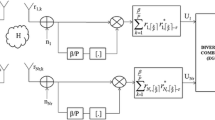Abstract
In wireless communications, chaotic communications have been a field of interest due to its low complexity in hardware implementation and low power consumption in chaotic signal generation. Among the modulation schemes using the chaotic signal, Differential Chaos Shift Keying (DCSK) is a robust noncoherent technique. Multiple-input multiple-output (MIMO) system is a technology that uses multiple transmit and/or multiple receive antennas in order to improve the system performance in wireless systems. In our paper, we have proposed a new scheme of MIMO-DCSK which utilizes the benefits of MIMO system into the chaotic communication system by transmitting and receiving DCSK modulated signals through multiple antennas. Our analysis and simulation results show how the chaotic communications in the new MIMO-DCSK benefits over the single input single output (SISO) system and the BER performance of DCSK in additive white Gaussian noise (AWGN) channels using Alamouti space-time code and the maximum likelihood decoding is analyzed.
This research was supported by the MIC (Ministry of Information and Communication), Korea, under the ITRC (Information Technology Research Center) support program supervised by the IITA (Institute of Information Technology Advancement). (IITA-2006-(C1090-0603-0019)).
Preview
Unable to display preview. Download preview PDF.
Similar content being viewed by others
References
Ben Farah, M.A., Kachouri, A., Samet, M.: Design of secure digital communication systems using DCSK chaotic modulation. In: Design and Test of Integrated Systems in Nanoscale Technology, pp. 200–204 (Sept. 5-7, 2006)
Galias, Z., Maggio, G.M.: Quadrature chaos-shift keying: theory and performance analysis. IEEE Transactions on Circuits and Systems-I: Fundamental Theory and Applications 48(12), 1510–1519 (2001)
Kim, Y., Kim, J., Kim, J.-H., Kang, J.: Comparison of DCSK Receiver and Enhanced DCSK Receiver with Synchronization Error. In: VTC 2006-spring IEEE 63rd, vol. 5, pp. 2261–2265 (2006)
Kolumban, G., Krebesx, T.: UWB Radio: A Real Chance for Application of Chaotic Communications. In: NOLTA, 11-14 September 2006, pp. 475–478 (2006)
Dmitriev, A.S., Panas, A.I., Zakharchenko, K.V.: Basic Principles of Direct Chaotic Communications. Nonlinear Phenomena in Complex Systems 6(1), 1–14 (2003)
Kennedy, M.P., Kolumban, G., Kis, G., Jako, Z.: Performance evaluation of FM-DCSK modulation in multipath environments. IEEE Transactions on Circuits and Systems-I: Fundamental Theory and Applications 47(12), 1702–1711 (2000)
Jankiraman, M.: Space-time codes and MIMO systems. Artech House, Boston (2004)
Author information
Authors and Affiliations
Editor information
Rights and permissions
Copyright information
© 2007 Springer Berlin Heidelberg
About this paper
Cite this paper
Thapaliya, K., Yang, Q., Kwak, K.S. (2007). Chaotic Communications in MIMO Systems. In: Lee, YH., Kim, HN., Kim, J., Park, Y., Yang, L.T., Kim, S.W. (eds) Embedded Software and Systems. ICESS 2007. Lecture Notes in Computer Science, vol 4523. Springer, Berlin, Heidelberg. https://doi.org/10.1007/978-3-540-72685-2_65
Download citation
DOI: https://doi.org/10.1007/978-3-540-72685-2_65
Publisher Name: Springer, Berlin, Heidelberg
Print ISBN: 978-3-540-72684-5
Online ISBN: 978-3-540-72685-2
eBook Packages: Computer ScienceComputer Science (R0)




